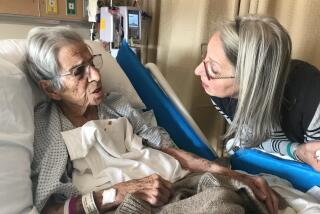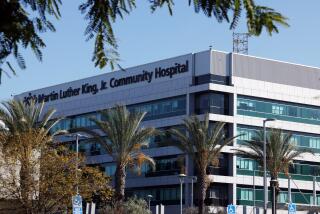Hospital Offers Low-Income Patients a Debt-Free Bill of Health
- Share via
FARMINGTON, Maine — Yankee pride runs fierce and strong in this cold, harsh pocket of rural poverty, but so does a spirit of ingenuity that is often born of hardship. These qualities met head-on a year ago, just as hospital administrator Pete Tucker was wondering if he would be buried alive by the mountain of unprocessed paperwork in his office and when, at the very same moment, 60-year-old Della O’Leary was worrying about how to pay off her gallbladder surgery.
Four months later, Tucker’s office at Franklin Memorial Hospital here was spotless--and O’Leary’s bill at the 70-bed facility was settled. By working off her $8,000 tab, the part-time receptionist became the first beneficiary of the hospital’s Contract for Care, a novel program that allows patients to clear their bills by providing services to Franklin Memorial.
“If I hadn’t done this, good Lord, I would be paying off that surgery for the rest of my life,” said O’Leary, who, like many of the 29,000 residents in the remote county that Franklin Memorial caters to, has no health insurance.
O’Leary said she welcomed the job that Tucker, the hospital’s marketing and planning director, had dreaded as “the data-entry project from hell.” “I didn’t have the feeling that I was taking charity,” O’Leary added. “I really enjoyed the work.”
Salaries here are low--on average, less than $17,000 per capita per year--and unemployment is high, hovering around 8%. In the winter, the figure climbs still more. Close to one-fifth of the population has no health insurance, and many who do are undercovered.
In that regard, this part of western Maine mirrors much of rural America--so much so that Nancy Cameron Dickinson, a Contract for Care alumna who planted a flower garden at the hospital to pay off her Fallopian tube surgery, calls her home area “the Appalachia of the North.”
But what the Farmington area lacks in material prosperity, it makes up for in resourcefulness. Richard A. Batt, the president of Franklin Memorial, recalled that three years ago, a writer who had fallen on hard times came to him in tears, asking for a break on his children’s medical bills. Moved by the man’s plight, Batt also remembered that the hospital had some brochures that needed rewriting.
“I made this fellow’s day,” Batt said. “He was transformed. He felt fantastic.”
That encounter set Batt to thinking about formalizing a system of barter. His board of directors embraced his proposal, not to replace the institution’s practice of writing off about 1% of its $38-million annual income as charity care, but to augment it with the Contract for Care. Using government guidelines, they opened the plan to suitable patients with income below the federal poverty level.
Patients are required only to promise that they will work, Batt said, because “up here, a promise is as good as a contract.” Contract for Care workers have painted parts of the hospital and worked in the emergency room.
“When the Franklin Memorial auxiliary has their bake sale, and someone wants to bake things and put them in there to pay off their bill, we’ll gladly let them,” he said. “If someone wants to go in and sing to the kids in the pediatric unit, that sounds good too.”
Batt said the hospital has received calls from health care facilities around the country that would like to clone Contract for Care. But while Richard H. Wade, senior vice president of the American Hospital Assn. in Washington, said the program “is unique now,” trading services for health care has time-honored roots in American history.
Particularly at a time when “the number of uninsured people, and underinsured people, is expected to soar,” Wade said there is no downside to reviving a tradition that once saw farm families paying their doctor with a year’s worth of fresh produce. What’s more, Wade observed, the notion is highly portable. “It could be a whole way of connecting people to their communities, and to their hospitals, that we have not even thought about.”
Here in Farmington, the community connection looms large. Batt and his staff have also introduced a wallet-sized hospital card, available to anyone who asks for it, that offers a 10% discount on hospital services. As a bonus, Franklin Memorial card carriers also get breaks at local businesses.
Batt also established a team of 50 regional “health leaders” who meet regularly with economically disadvantaged families--in the families’ homes--in an attempt to identify needs.
*
And Batt said it turns out that benevolence is also profitable. “Our hospital is fantastically successful financially,” he said. Franklin Memorial remains one of the lowest-cost hospitals in the state, Batt said, with its strength traced to “phenomenal increases in market share” attributable to the institution’s positive relationship with its community.
A cynical public might dismiss this institutional do-good approach as slick marketeering. But Batt countered that “there’s an incredible moral to this story. We have not set out to be incredibly profitable. But that’s what’s happened. In five years, we’ve become one of the strongest hospitals of our size in New England. We’ve done this as a corollary, as a direct result, of serving our community well. So the bottom line here, literally, is that if you meet community needs, you will be enormously successful as a business.”
Yet out in the hospital’s garden, surrounded by the lupines (“a good Maine flower”) and Shasta daisies that she spent the spring tending, Nancy Cameron Dickinson was unconcerned about Franklin Memorial’s profit structure. Working at the hospital made her feel valued, the unemployed teacher said. “Maybe if they did it this way in more places, it might keep people from feeling so much despair about mounting medical prices.”
More to Read
Sign up for Essential California
The most important California stories and recommendations in your inbox every morning.
You may occasionally receive promotional content from the Los Angeles Times.










